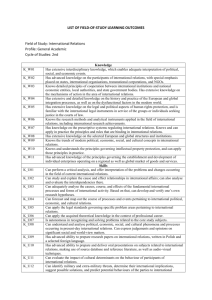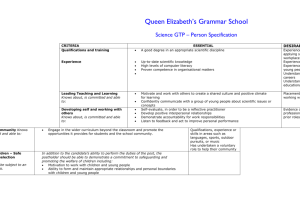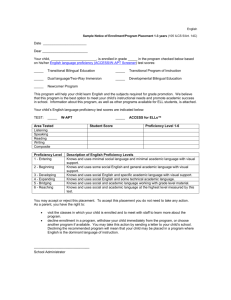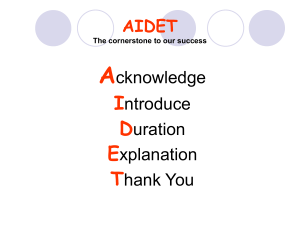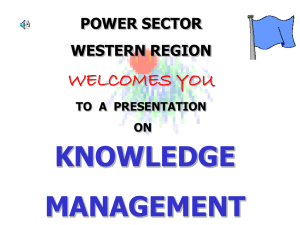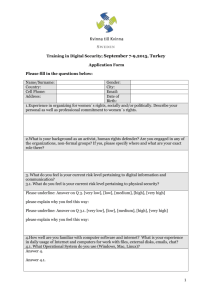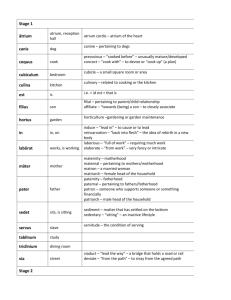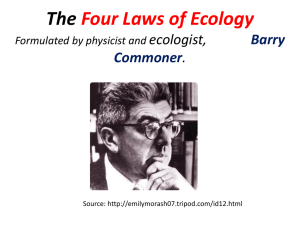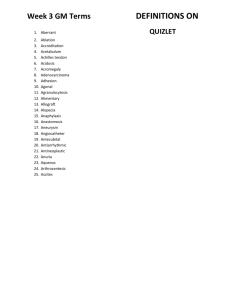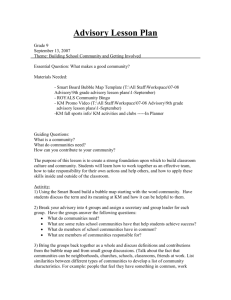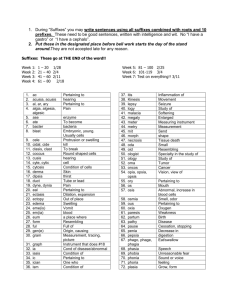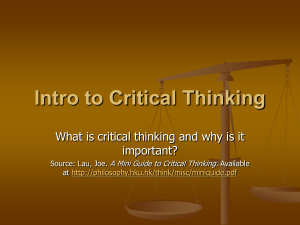LIST OF FIELD-OF-STUDY LEARNING OUTCOMES
advertisement
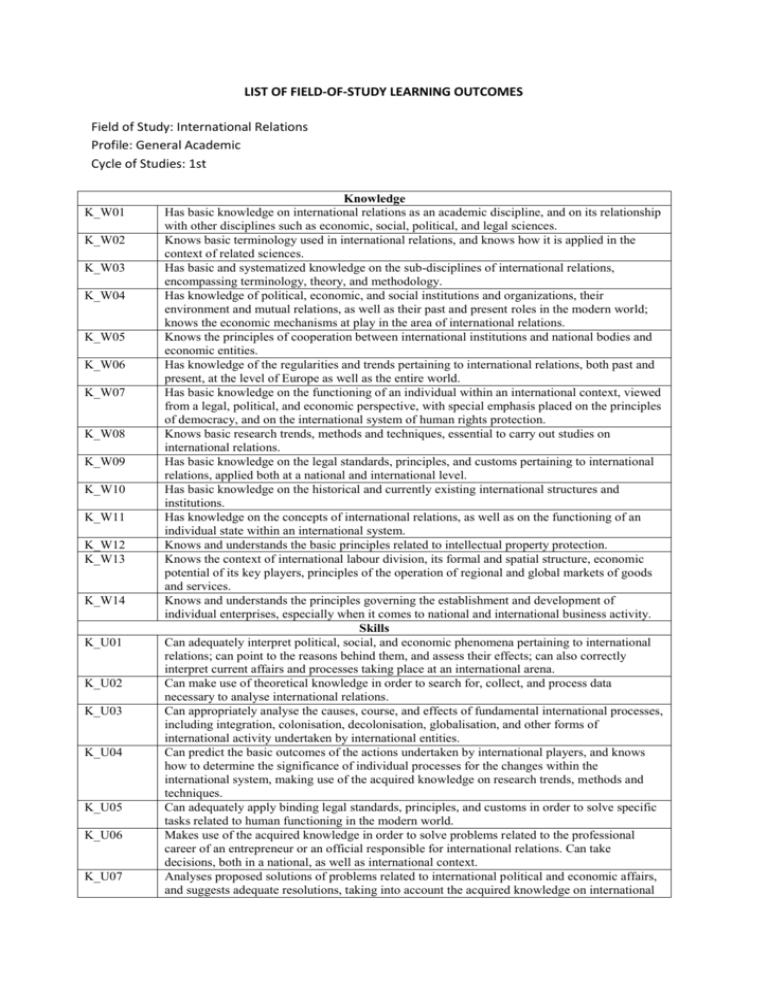
LIST OF FIELD-OF-STUDY LEARNING OUTCOMES Field of Study: International Relations Profile: General Academic Cycle of Studies: 1st K_W01 K_W02 K_W03 K_W04 K_W05 K_W06 K_W07 K_W08 K_W09 K_W10 K_W11 K_W12 K_W13 K_W14 K_U01 K_U02 K_U03 K_U04 K_U05 K_U06 K_U07 Knowledge Has basic knowledge on international relations as an academic discipline, and on its relationship with other disciplines such as economic, social, political, and legal sciences. Knows basic terminology used in international relations, and knows how it is applied in the context of related sciences. Has basic and systematized knowledge on the sub-disciplines of international relations, encompassing terminology, theory, and methodology. Has knowledge of political, economic, and social institutions and organizations, their environment and mutual relations, as well as their past and present roles in the modern world; knows the economic mechanisms at play in the area of international relations. Knows the principles of cooperation between international institutions and national bodies and economic entities. Has knowledge of the regularities and trends pertaining to international relations, both past and present, at the level of Europe as well as the entire world. Has basic knowledge on the functioning of an individual within an international context, viewed from a legal, political, and economic perspective, with special emphasis placed on the principles of democracy, and on the international system of human rights protection. Knows basic research trends, methods and techniques, essential to carry out studies on international relations. Has basic knowledge on the legal standards, principles, and customs pertaining to international relations, applied both at a national and international level. Has basic knowledge on the historical and currently existing international structures and institutions. Has knowledge on the concepts of international relations, as well as on the functioning of an individual state within an international system. Knows and understands the basic principles related to intellectual property protection. Knows the context of international labour division, its formal and spatial structure, economic potential of its key players, principles of the operation of regional and global markets of goods and services. Knows and understands the principles governing the establishment and development of individual enterprises, especially when it comes to national and international business activity. Skills Can adequately interpret political, social, and economic phenomena pertaining to international relations; can point to the reasons behind them, and assess their effects; can also correctly interpret current affairs and processes taking place at an international arena. Can make use of theoretical knowledge in order to search for, collect, and process data necessary to analyse international relations. Can appropriately analyse the causes, course, and effects of fundamental international processes, including integration, colonisation, decolonisation, globalisation, and other forms of international activity undertaken by international entities. Can predict the basic outcomes of the actions undertaken by international players, and knows how to determine the significance of individual processes for the changes within the international system, making use of the acquired knowledge on research trends, methods and techniques. Can adequately apply binding legal standards, principles, and customs in order to solve specific tasks related to human functioning in the modern world. Makes use of the acquired knowledge in order to solve problems related to the professional career of an entrepreneur or an official responsible for international relations. Can take decisions, both in a national, as well as international context. Analyses proposed solutions of problems related to international political and economic affairs, and suggests adequate resolutions, taking into account the acquired knowledge on international K_U08 K_U09 K_U10 K_U11 K_U12 K_U13 K_U14 K_U15 K_U16 K_U17 K_K01 K_K02 K_K03 K_K04 K_K05 K_K06 K_K07 K_K08 K_K09 K_K10 K_K11 relations. Can evaluate the usefulness of typical methods, procedures, and good practices for the implementation of tasks related to different spheres of domestic and international activity. Can understand and analyse different processes and phenomena occurring in the context of modern international relations. Can prepare typical papers, written in Polish, on the events and processes pertaining to international relations, based on national and foreign sources of data. Makes use of the knowledge on economy, history, theory and concepts of international relations and relevant legal systems. Can prepare oral presentations in Polish, analysing events and processes pertaining to international relations, based on national and foreign sources of data, and making use of the knowledge on economy, history, theory and concepts of international relations and relevant legal systems. Has the skills enabling interpersonal communication, can use specialist language, and communicates in a way that is precise both with the experts on international relations, as well as the interlocutors outside of the group of specialists. Can recognize the cultural specificity, relevant customs and principles of carrying out business activity and engaging in interpersonal relations in different regions of the world. Can identify current conflicts in the world; can point to the causes behind them, as well as to their impact on modern international relations. Knows the means of amicable resolution of international disputes and conflicts; makes proper use of the knowledge on human rights protection in the context of international relations and internal state policies. Knows how to make use of the acquired knowledge on the scope of activity of EU institutions, mechanisms behind their decision- taking process, and principles governing community policies. Has a command of a selected foreign language at the B2 level of the European Framework of Reference for Languages, facilitating the performance of tasks requiring some knowledge on international relations. Social Competencies Understands the need for acquiring and updating knowledge on international relations throughout one’s entire life. Can work in a team in an international and multicultural environment. Can adequately determine priorities, when it comes to solving tasks pertaining to the analysis, explanation or forecasting of events in the context of international relations. Correctly recognizes specific problems related to different phenomena pertaining to the field of international relations, which is useful in professional life. Can work on the preparation of projects aimed at a practical implementation of the acquired knowledge on international relations. Can update the acquired knowledge on the basis of current events and new historical facts coming to light. Can operate on the domestic and international market, taking into account the basic knowledge on entrepreneurship. Recognises and expresses work-related moral problems and ethical dilemmas; looks for optimum solutions, and acts in accordance with the fundamental principles of ethics. Is well-aware of the social, economic, and legal effects of the decisions undertaken in the context of one’s professional career. Is capable of a well-though-out assessment, and can draw conclusions from political and economic events. Spares no effort and is determined to accomplish individual and team tasks.
